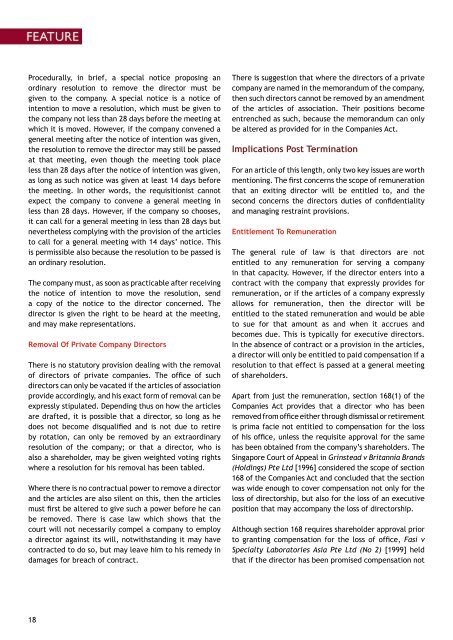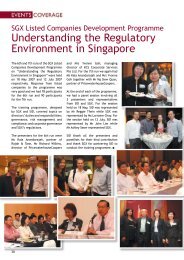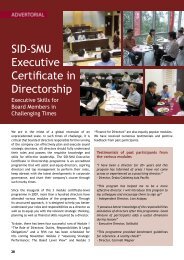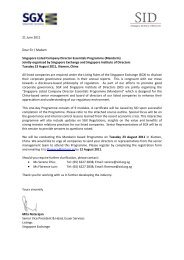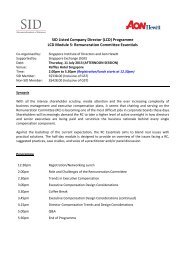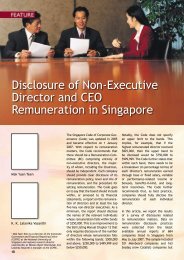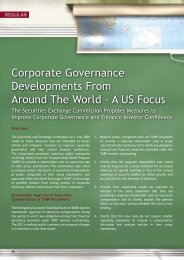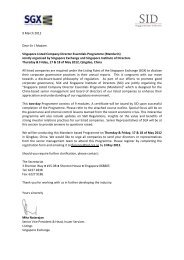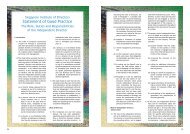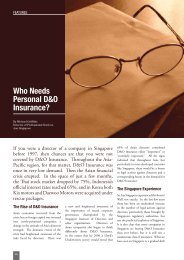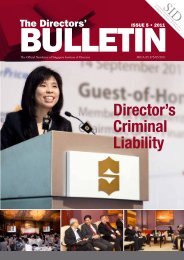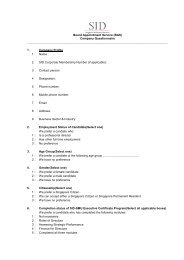Termination Of Director In A Time Of Retrenchments - Singapore ...
Termination Of Director In A Time Of Retrenchments - Singapore ...
Termination Of Director In A Time Of Retrenchments - Singapore ...
- No tags were found...
Create successful ePaper yourself
Turn your PDF publications into a flip-book with our unique Google optimized e-Paper software.
Procedurally, in brief, a special notice proposing anordinary resolution to remove the director must begiven to the company. A special notice is a notice ofintention to move a resolution, which must be given tothe company not less than 28 days before the meeting atwhich it is moved. However, if the company convened ageneral meeting after the notice of intention was given,the resolution to remove the director may still be passedat that meeting, even though the meeting took placeless than 28 days after the notice of intention was given,as long as such notice was given at least 14 days beforethe meeting. <strong>In</strong> other words, the requisitionist cannotexpect the company to convene a general meeting inless than 28 days. However, if the company so chooses,it can call for a general meeting in less than 28 days butnevertheless complying with the provision of the articlesto call for a general meeting with 14 days’ notice. Thisis permissible also because the resolution to be passed isan ordinary resolution.The company must, as soon as practicable after receivingthe notice of intention to move the resolution, senda copy of the notice to the director concerned. Thedirector is given the right to be heard at the meeting,and may make representations.Removal <strong>Of</strong> Private Company <strong>Director</strong>sThere is no statutory provision dealing with the removalof directors of private companies. The office of suchdirectors can only be vacated if the articles of associationprovide accordingly, and his exact form of removal can beexpressly stipulated. Depending thus on how the articlesare drafted, it is possible that a director, so long as hedoes not become disqualified and is not due to retireby rotation, can only be removed by an extraordinaryresolution of the company; or that a director, who isalso a shareholder, may be given weighted voting rightswhere a resolution for his removal has been tabled.Where there is no contractual power to remove a directorand the articles are also silent on this, then the articlesmust first be altered to give such a power before he canbe removed. There is case law which shows that thecourt will not necessarily compel a company to employa director against its will, notwithstanding it may havecontracted to do so, but may leave him to his remedy indamages for breach of contract.There is suggestion that where the directors of a privatecompany are named in the memorandum of the company,then such directors cannot be removed by an amendmentof the articles of association. Their positions becomeentrenched as such, because the memorandum can onlybe altered as provided for in the Companies Act.Implications Post <strong>Termination</strong>For an article of this length, only two key issues are worthmentioning. The first concerns the scope of remunerationthat an exiting director will be entitled to, and thesecond concerns the directors duties of confidentialityand managing restraint provisions.Entitlement To RemunerationThe general rule of law is that directors are notentitled to any remuneration for serving a companyin that capacity. However, if the director enters into acontract with the company that expressly provides forremuneration, or if the articles of a company expresslyallows for remuneration, then the director will beentitled to the stated remuneration and would be ableto sue for that amount as and when it accrues andbecomes due. This is typically for executive directors.<strong>In</strong> the absence of contract or a provision in the articles,a director will only be entitled to paid compensation if aresolution to that effect is passed at a general meetingof shareholders.Apart from just the remuneration, section 168(1) of theCompanies Act provides that a director who has beenremoved from office either through dismissal or retirementis prima facie not entitled to compensation for the lossof his office, unless the requisite approval for the samehas been obtained from the company’s shareholders. The<strong>Singapore</strong> Court of Appeal in Grinstead v Britannia Brands(Holdings) Pte Ltd [1996] considered the scope of section168 of the Companies Act and concluded that the sectionwas wide enough to cover compensation not only for theloss of directorship, but also for the loss of an executiveposition that may accompany the loss of directorship.Although section 168 requires shareholder approval priorto granting compensation for the loss of office, Fasi vSpecialty Laboratories Asia Pte Ltd (No 2) [1999] heldthat if the director has been promised compensation not18


